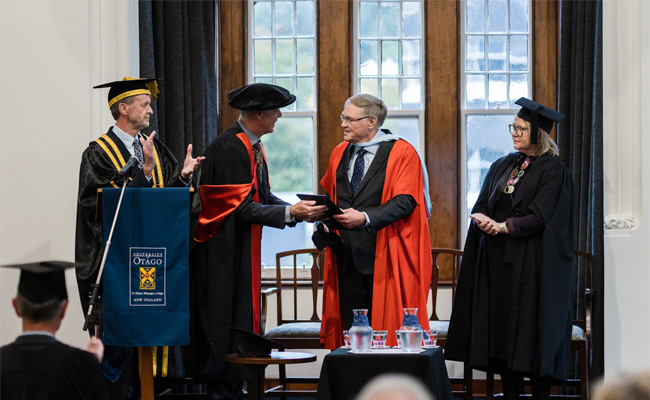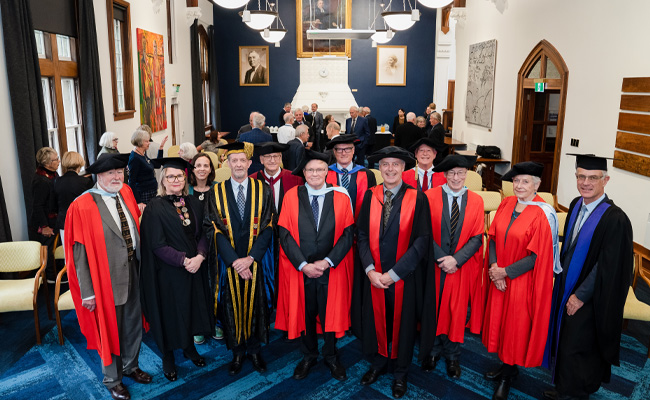
From left, Chancellor Stephen Higgs, Acting Vice-Chancellor Professor Richard Blaikie presenting Emeritus Professor Don McRae with his HonLLD, and Dean of Law Professor Shelley Griffiths.
Representing Canada and New Zealand, attending both Cambridge and Columbia universities, an eminent law academic and a leading counsel, Emeritus Professor Don McRae CC, ONZM, FRSC, brings a wealth of different perspectives to his profession.
Back in New Zealand for Otago's Law 150th celebrations in April, Professor McRae was recognised for his significant achievements in the field of law, with the conferring of an Honorary Doctor of Laws by the University.
Since graduating from Otago with an LLB in 1966 and an LLM in 1967, he has had a distinguished career as a professor of law in Canada. He is also Canada's leading authority in several international legal fields, particularly international trade and investment law, maritime boundary law and fisheries law. He was made a Fellow of the Royal Society of Canada in 2002, awarded Companion of the Order of Canada in 2014, and made officer of the New Zealand Order of Merit in 2017.
But as a student at Taieri High School in the early 1960s, a legal career hadn't been on his radar.
Keen on humanities rather than sciences, he was thinking about following in his father's footsteps and becoming a teacher. His father, however, suggested doing law, and despite knowing nothing about the profession, he enrolled at Otago, took introductory law taught by Dean of Law Professor Frank Guest, and the rest is history.
“I think that class did it for me. I was fascinated by the things he taught us, the organisation, the structure and I just continued to enjoy it throughout the whole time.”
He says his understanding of the role law plays in the major issues of our lives, as individuals, communities, states and nations, all started in those classes at Otago.
“The world has undergone great change since my days at Otago. What I do now bears little relationship to what I studied at law school; international trade law did not exist as a discipline. But what I gained from Otago was the foundation for what is critical in legal thinking, in legal analysis.”
A highlight of his time at Otago was helping to establish the Otago Law Review and becoming its inaugural general editor. One less positive reflection on his student days was how his classful of men did not give their fellow student, now Dame Silvia Cartwright ONZ, PCNZM, DBE, QSO, DStJ, the recognition she deserved.
“She has talked about that, how she was isolated. Looking back, I understand that, because we just did things that young men did in those days. We went drinking, played rugby and there was no place for Silvia, in hindsight it was terrible. It's amazing that what she did was survive, thrive and show us all up.”
After two years as an assistant lecturer at Otago after graduating, he left for postgraduate studies at the University of Cambridge, having decided in his third year he was interested in International Law. This interest was also spurred by a book he read on the war in Indochina, while completing his officer's training during National Service.
“I think that just reinforced my interest and I wanted to go to grad school and study International Law with the people I'd just read.
“I was very fortunate at Cambridge. I had the leading international lawyers there and was able to see them, visit them, talk to them, become friends with them, and that lasted over the years.”
From Cambridge, he attended Columbia Law School in New York, for further postgraduate legal studies.
“Cambridge deepened my understanding of law and of the possibilities of [a career as] an academic, Columbia more broadened my understanding of law in society. It was there that people were starting to do sociological research in law. I regarded both things as valuable parts of my education.”

Distinguished Alumni gathered at the honorary degree ceremony *
Since the early 1970s, Professor McRae has worked as a professor of law in Canada, at the University of Western Ontario, the University of British Columbia (UBC) and the University of Ottawa, where he is now an Emeritus Professor.
Early on, he turned down a tenured teaching position at UBC in favour of a one-year term, in the hope of being offered a job at the United Nations (UN) in New York, despite jobs being frozen at the time. “Looking back, I can't believe I did that!”
“I heard nothing from the UN. I enjoyed the teaching, the students, the environment, Vancouver. The Dean said do you want a tenured position and I said sure. And of course two weeks later I got a letter from the UN saying now we want to open discussions.
“I stayed at UBC, the best decision I ever made. Becoming an international civil servant would have been the wrong thing, I know people who did that, they were very good, but in those days, they were quite disillusioned about working in the UN. I don't think I would have had any of the opportunities I've had as a result of working at UBC.”
He says teaching was always something he took a great delight in, along with research and writing. “As an academic you write lots of things and some you think are worthwhile and some not. Some things that I wrote I think had an impact, people cite or refer to them, so that was always an important aspect of what you do.”
In 1982 he took leave and moved east to Ottawa to spend a year as Academic in Residence in the government's Foreign Affairs Legal Bureau, which became three years.
After returning to UBC, the University of Ottawa got in touch and asked if he'd be interested becoming Dean of the University's Law School.
“Having spent three years in Ottawa, my kids were in schools there and knew people there and I realised it's much more difficult to have a career as an international lawyer when you're in Vancouver.”
Alongside his University teaching, he became a leader in the fields of maritime boundary law and international trade and investment law. His expertise has been regularly sought by UN agencies and other international organisations, and has seen him serve as counsel, for both Canada and New Zealand, in maritime boundary disputes and World Trade Organization (WTO) cases.
He sat on dispute settlement panels under the Canada-US Free Trade Agreement, the US-Israel Free Trade Agreement, the North American Free Trade Agreement (NAFTA) as well as its successor, the United States, Mexico, Canada Agreement (USMCA), and the WTO.
It was through a contact at the New Zealand High Commission that he came to represent New Zealand in a dispute with the European Union in the WTO. New Zealand wanted someone from North America to look at their pleadings and give them an outside view.
“We made the mistake of winning all the time so they kept inviting me back. Given the kinds of cases New Zealand had, if you'd lost it would have been very surprising in those days because states had lots of restrictive measures when the WTO came into effect. If you brought a case against another state, the likelihood of winning was very high.”
He even worked on a case for New Zealand against Canada. “Some people from Canada were not very happy with that, but other lawyers said, 'that's what you do, you take the client that asks you'.”
Professor McRae is also one of only three Canadians to have been elected to the United Nations' International Law Commission (in 2006). After being elected for a second term, he served on the Commission for 10 years. Established to codify and develop International Law, the Commission includes representatives from 36 countries who meet to deal with particular topics of International Law.
“That's more what some people call general International Law not necessarily trade . . . you really have to be knowledgeable on each area of the law. States don't like having large multilateral treaties anymore, so often what commissioners are doing is putting forward draft principles, guidelines, things to help move the law in a certain direction without ending up with a treaty. That certainly was a highlight of my career.”
Another high point was his involvement in establishing the Society of International Economic Law in 2008 and serving as its first President.
“It's quite a unique body because unlike most societies this is not nationally-based. It has members who are interested in trade from many countries around the world – Southeast Asia, China, Japan, Europe, Africa, Asia.”
Professor McRae has also been a member of the Permanent Court of Arbitration, based in The Hague, since 1998.
He retired from the University of Ottawa in 2016, but continues to research and write, and serves as a Judge ad hoc at the International Court of Justice. Under the rules of the Court, if a state is a party to a case before the court and it doesn't have its own national on the court, it can appoint a Judge ad hoc.
He also continues to arbitrate on investment disputes – those between private investors against governments, and disputes between governments. “There's a case we're involved in between Russia and Ukraine over Crimea. The case is continuing notwithstanding there's a war going on.”
Looking back at his academic career, he says legal education is “much richer and deeper” than it was 50 years ago, with the biggest change being the move towards inclusivity and diversity in law schools. It began during his time at UBC with increasing numbers of women studying and teaching law, and continued in Ottawa, with the introduction of the French Common Law programme, and moves to address issues of access and equity for First Nations and Black students.
“We're starting to get there in Canada, but that's where education, I think, is not so much about the law as about how law functions. You look at not just traditional ways of thinking and teaching, and take into account the knowledge of indigenous people. I see that's what's happening here [at Otago] and I think it's way ahead.”
In receiving his Hon LLD from Otago, he says he is “proud not only to receive recognition from my own law school and university, but to be receiving it from a law school at the forefront of progress in addressing inequities in legal education and in our society”.
*Honorary Doctor of Laws recipient Emeritus Professor Don Macrae (centre), at the ceremony in the University Council Chambers, with, from left; Sir Bruce Robertson, Dean of Law Professor Shelley Griffiths, Pro-Vice-Chancellor Humanities Professor Jessica Palmer, Chancellor Stephen Higgs, Dr George Davis, Professor McRae, Professor Hugh Campbell, Deputy-Vice-Chancellor (Research and Enterprise) Professor Richard Blaikie, Professor John Dawson, Dr Royden Somerville KC, Dame Silvia Cartwright, President NZ Law Society Frazer Barton.
Kōrero by Margie Clark
